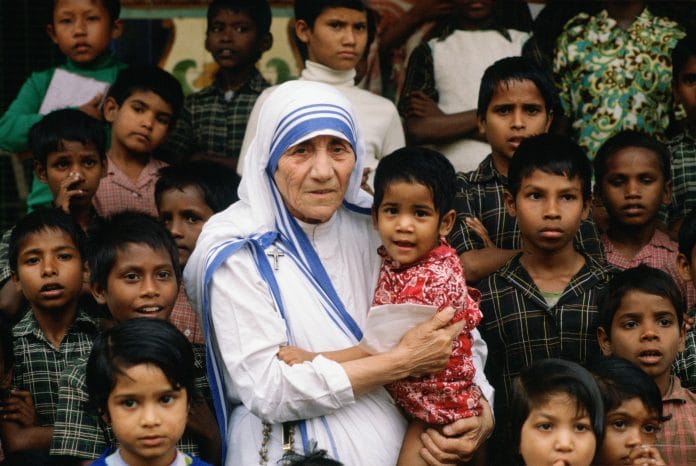Winner of the 1979 Nobel Peace Prize, the Catholic nun created one of the world’s largest missionary groups — Missionaries of Charity.
New Delhi: Great deeds of generosity and kindness deem one fit for the honour of being called a ‘saint’. Mother Teresa, whose 108th birth anniversary it is today, was no exception.
The Catholic nun who served the poor and destitute of Calcutta (now Kolkata) went on to create one of the world’s largest missionary groups — Missionaries of Charity — an order of 3,000 nuns and 400 brothers in 87 countries, tending to the poor in 167 cities across the globe. Her order has been recognised as a “missionary movement without parallel”.
Also read: Unwed mothers made to give up claims on babies by Missionaries of Charity staff in Ranchi
Mother Teresa was born to Albanian parents in Skopje, Macedonia on 26 August, 1910 and baptised Agnes Gonxha Bojahxiu. A 12-year-old Agnes strongly felt the ‘call of God’ and was drawn to missionary and charity work. At the age of 18, she left home to join Sisters of Loreto, an Irish community of nuns with missions in India. Soon, she arrived in Calcutta where she started teaching at St Mary’s School.
However, the call for serving the poor made her quit her job and venture into the South Calcutta slums where she started an open-air school for the poor.
She also founded a shelter home called ‘Nirmal Hriday’ which served the poor and the destitute people of the city. At a time when leprosy patients were seen as ‘untouchables’, Mother Teresa brought them medical attention and care.
She was conferred the Nobel Peace Prize for her humanitarian work in 1979. Later, she was canonized posthumously in September 2016, where she was raised to the status of ‘saint’.
Also read: How police tracked children sold from Missionaries of Charity and ensured a happy ending
However, for all the love and admiration that she enjoyed, she also drew criticism from various corners. One of her biggest critics was journalist Christopher Hitchens who called her ‘fraudulent’ and a ‘fanatic’. In his 1994 documentary titled Hell’s Angel, Hitchens used footage from the Nobel Prize ceremony of 1979, where in her acceptance speech Mother Teresa said, “the greatest destroyer of peace today is the cry of the innocent, unborn child. If a mother can kill her own child in her womb, what is left for you and for me to kill, each other?”
She advocated her pro-life ideas openly, while criticising the practice of abortion and contraceptives.
Many of her critics say that she held an almost romantic idea of poverty within which suffering meant that God was ushering his blessings. Her charity home ‘Nirmal Hriday’, which was hailed as a place where the destitute could die with dignity, is also said to keep the diseased under unhygienic conditions.
Earlier this year, her group made headlines after it was alleged that a home in Ranchi was involved in an adoption racket.
However, regardless of criticism and questions, her contributions to humanity were founded on the ideas of love and care, especially towards the ones whose lives she touched — in life and in death.






